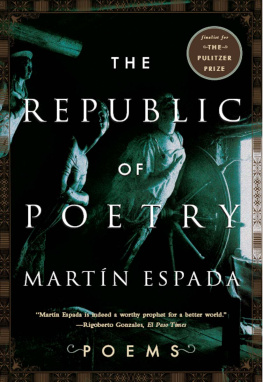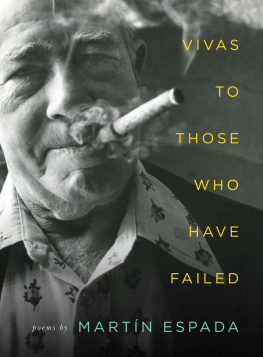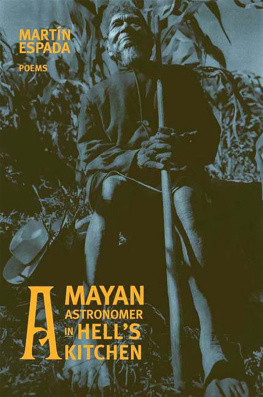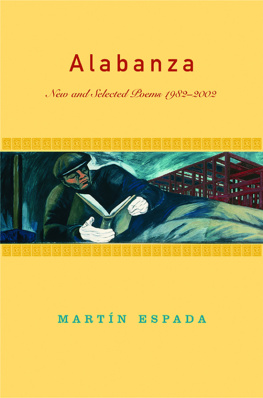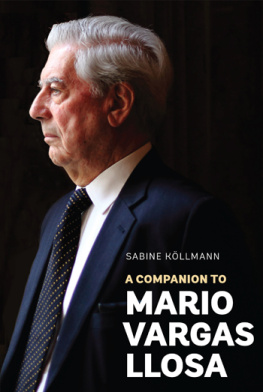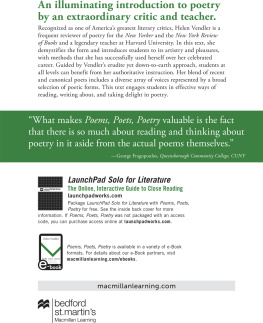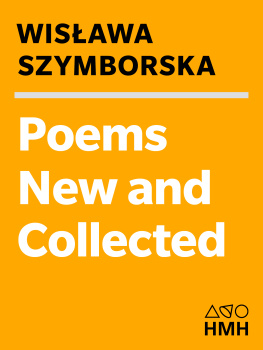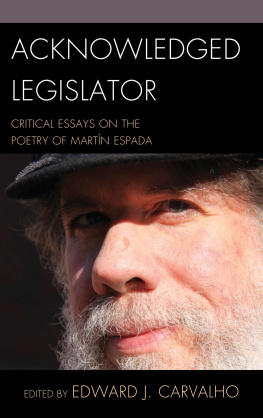W. W.
NORTON & COMPANY NEW YORK LONDON Copyright 2006 by Martn Espada All rights reserved For information about permission to reproduce selections from this book, write toPermissions, W.W. Norton & Company, Inc., 500 Fifth Avenue, New York, NY 10110 Production manager: Anna Oler Library of Congress Cataloging-in-Publication Data Espada, Martn, 1957
The republic of poetry / Martin Espada.1st ed.
p. cm.
Poems.
ISBN: 978-0-393-06970-9
I. Title. PS3555.S53R47 2006
811'.54dc22 2006013008 W. W.
Norton & Company, Inc., 500 Fifth Avenue, New York, N.Y. 10110
www.wwnorton.com W. W. Norton & Company Ltd., Castle House, 75/76 Wells Street, London W1T 3QT This book is dedicated to Daro
Acknowledgments
These poems have appeared or will appear in the following publications, to whose editors grateful acknowledgment is made: The Bloomsbury Review : Black Islands, The Republic of Poetry Dance the Guns to Silence: 100 Poems for Ken Saro-Wiwa: The Soldiers in the Garden Hanging Loose : An Admirer of General Pinochet Writes to the Web Site of General Pinochet to Wish General Pinochet a Happy Birthday, Between the Rockets and the Songs, Blues for the Soldiers Who Told You, To the Burmese Albino Python in the Next Room, The God of the Weather-Beaten Face Illuminations: Stone Hammered to Gravel In The Grove: Rules for Captain Ahabs Provinceton Poetry Workshop, Advice to Young Poets, I Have an Eel in My Heart The Massachusetts Review : You Got a Song, Man Meena: A Bilingual Journal of Arts and Letters: Why My Bones Hate the Ice The New Yorker: City of Glass, Return Peacework: General Pinochet at the Bookstore Ploughshares: The Poets Coat The Progressive : Not Here Rattapallax: City of Glass, General Pinochet at the Bookstore, Not Here, Rain Without Rain, Something Escapes the Bonfire, Sonnet in Praise of Jaiva Pie Excerpt from Pastoral of Chile (IX) from Anteparadise by Ral Zurita, translated by Jack Schmitt, copyright 1986 by the Regents of the University of California. Reprinted by permission of the University of California Press. Many thanks to the following individuals and organizations: to Jack Ageros, for his translations of Julia de Burgos and his research on her life; to Doug Anderson and the other veteran writers of the Joiner Center; to Mara Luisa Arroyo, for proofreading; to Chris Brandt and the Medicine Show Theatre, for adapting three of the Chile poems for the stage in their production, The Republic of Poetry; to Ram Devineni, Bob Madey, Rodrigo Rojas, and Jos Ignacio Silva, for making the visit to Chile possible and memorable; to Ariel Dorfman, for reading the Chile poems; to Katherine and Klemente Gilbert-Espada, my wife and son; to George Evans, for his help with images of Marfa, Texas; to Frances Goldin, my heroic agent; to Sam Hamill and Poets Against War, for posting two of these poems on their Web site (poetsagainstwar.net), and for all their good work; to Joan Jara, for sharing her story with me at Estadio Vctor Jara; to Yusef Komunyakaa and Nathalie Handal, the poets who joined me on the journey to Nerudas Chile; to Oscar Sarmiento, for translating the Chile poems into Spanish; to the John Simon Guggenheim Memorial Foundation and the AE Ventures Foundation, for their support; to compaero Ral Zurita, for the walk at La Moneda; and to the Acentos/LouderArts crew (Oscar, Rich, Fish, Jessica, Elial, Roger, y Lynne).
See also Notes on the Poems.
T HE R EPUBLIC OF P OETRY
for Chile
In the republic of poetry, a train full of poets rolls south in the rain as plum trees rock and horses kick the air, and village bands parade down the aisle with trumpets, with bowler hats, followed by the president of the republic, shaking every hand. In the republic of poetry, monks print verses about the night on boxes of monastery chocolate, kitchens in restaurants use odes for recipes from eel to artichoke, and poets eat for free. In the republic of poetry, poets read to the baboons at the zoo, and all the primates, poets and baboons alike, scream for joy. In the republic of poetry, poets rent a helicopter to bombard the national palace with poems on bookmarks, and everyone in the courtyard rushes to grab a poem fluttering from the sky, blinded by weeping.
N OT H ERE
for Ral Zurita
Santiago de Chile, July 2004
The other poets tell me he tried to blind himself, taped his eyelids and splashed his face with ammonia.
N OT H ERE
for Ral Zurita
Santiago de Chile, July 2004
The other poets tell me he tried to blind himself, taped his eyelids and splashed his face with ammonia.
What Zurita saw gnawed like a parasite at the muscles in his eyes: Chiles warships invaded the harbor of Valparaso and subversives staggered at gunpoint through the city of hills down to the dock. Only the water knows how many faded away like black boots tossed into a black sea, or dangled from the masts, beaten by knuckles and rain into scarecrows the seagulls would pluck. September 11, 1973: Zuritas heart crashed deep in the ribs of a navy ship. The officer in charge of interrogation shook the poets papers and fumed: This is not poetry. The other poets tell me: Electricity was involved. Seven years later, Zurita blinked to save his eyes, and wrote: in the name of our love let even the steel-toed boots that kicked us be loved and those who mocking us said Do a little dance for us and put out their cigarettes on our arms so we would dance for them for our loves sake, for that alone, let them now dance.

